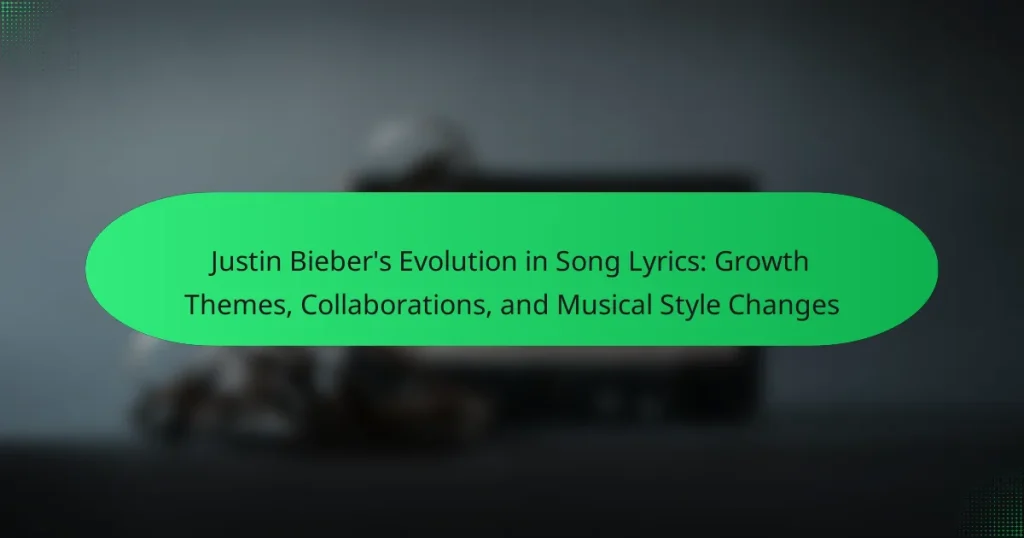Justin Bieber’s evolution in song lyrics reflects his personal growth and artistic maturity over the years. His lyrics have transitioned from youthful themes of love and heartbreak to more profound explorations of identity and emotional struggles. This change is evident in songs like “Sorry” and “Lonely,” which demonstrate a shift towards introspection. Collaborations with various artists have further enriched his lyrical content, allowing for diverse perspectives. Overall, Bieber’s lyrical evolution highlights his adaptability in the music industry and conveys themes of redemption and self-acceptance, marking his journey into adulthood.

What is the significance of Justin Bieber’s evolution in song lyrics?
Justin Bieber’s evolution in song lyrics signifies his personal growth and artistic maturity. Over the years, his lyrics have shifted from youthful themes of love and heartbreak to deeper reflections on identity and emotional struggles. This transformation mirrors his life experiences, including fame, relationships, and personal challenges. For instance, songs like “Sorry” and “Lonely” showcase a more introspective approach compared to his earlier work. The collaboration with various artists has also enriched his lyrical content, introducing diverse perspectives. This evolution highlights his adaptability in the music industry and resonates with a broader audience. Bieber’s lyrics now often convey messages of redemption and self-acceptance, reflecting his journey toward adulthood.
How have Justin Bieber’s lyrics reflected his personal growth over time?
Justin Bieber’s lyrics have increasingly reflected his personal growth through themes of maturity and self-reflection. Early songs often focused on youthful love and fame. For example, tracks like “Baby” highlighted the excitement of teenage romance. As Bieber matured, his lyrics began to explore deeper emotional struggles. Songs like “Sorry” and “Purpose” address accountability and healing. These later works showcase his journey through personal challenges, including mental health and relationships. The evolution in his lyrics mirrors his life experiences and growth as an individual. This shift is evident in the more introspective nature of his recent albums, such as “Changes” and “Justice.”
What key themes of growth are prevalent in his lyrics?
Key themes of growth in Justin Bieber’s lyrics include self-reflection, personal development, and emotional maturity. His lyrics often explore the journey of overcoming challenges. He addresses themes of love and heartbreak, showcasing vulnerability and resilience. Additionally, he reflects on fame and its impact on his identity. The evolution of his sound mirrors his personal growth, transitioning from teenage pop to more mature themes. Songs like “Sorry” and “Changes” illustrate his acknowledgment of past mistakes and desire for redemption. These themes resonate with listeners, highlighting relatable experiences of growth and change.
How do these themes compare across different albums?
Justin Bieber’s themes across different albums show a clear evolution in maturity and self-reflection. Early albums focus on youthful love and relationships. In contrast, later works delve into personal struggles and emotional growth. For instance, “Purpose” highlights themes of redemption and self-discovery. The album “Changes” further explores themes of love and commitment, reflecting a more mature perspective. Collaborations also vary, with earlier tracks featuring pop influences, while recent songs incorporate R&B and hip-hop elements. This shift in themes aligns with Bieber’s personal development and artistic exploration over the years.
What role do collaborations play in Justin Bieber’s lyrical evolution?
Collaborations significantly influence Justin Bieber’s lyrical evolution. They introduce diverse perspectives and styles into his music. Working with various artists broadens his thematic range. This expansion allows him to explore different emotions and narratives. Notable collaborations include “Despacito” with Luis Fonsi and Daddy Yankee. This song showcased his ability to blend pop with Latin influences. Additionally, his work with Ed Sheeran on “I Don’t Care” highlighted themes of acceptance and self-identity. Collaborations also enhance his marketability and reach. They connect him with different fan bases, fostering growth in his artistry.
Which notable artists has he collaborated with, and how have they influenced his lyrics?
Justin Bieber has collaborated with notable artists such as Ed Sheeran, Skrillex, and Chance the Rapper. These collaborations have significantly influenced his lyrics. Ed Sheeran’s songwriting style introduced deeper emotional themes into Bieber’s work. Skrillex’s electronic influence brought a more experimental sound to his music. Chance the Rapper’s collaboration on “Holy” added a spiritual dimension to Bieber’s lyrics. Each artist has contributed unique elements that reflect personal growth and diverse musical styles in Bieber’s evolution as a songwriter.
How do these collaborations reflect changes in his musical style?
Justin Bieber’s collaborations reflect significant changes in his musical style by introducing diverse genres and influences. These partnerships have allowed him to experiment with elements of R&B, hip-hop, and electronic music. Collaborating with artists like Ed Sheeran and Chance the Rapper has broadened his lyrical themes and vocal delivery. For instance, “Sorry” showcases a dancehall influence, while “Holy” incorporates gospel elements. Each collaboration marks a departure from his earlier pop-centric sound. This evolution illustrates his adaptability and willingness to embrace new musical directions. The variety in his collaborations highlights his growth as an artist and his exploration of different musical landscapes.
What changes in musical style can be observed in Justin Bieber’s lyrics?
Justin Bieber’s lyrics have evolved significantly over his career. Initially, his songs focused on themes of young love and innocence. As he matured, his lyrics began to explore deeper emotional subjects. This shift is evident in tracks like “Sorry” and “Purpose,” which address personal struggles and redemption. Additionally, Bieber has incorporated various musical styles, including R&B, EDM, and pop. Collaborations with artists like Ed Sheeran and DJ Khaled have further diversified his sound. This evolution reflects his growth as an artist and individual. Overall, Bieber’s lyrics now encompass a broader range of experiences and emotions.
How do genre shifts impact the themes and messages in his songs?
Genre shifts significantly alter the themes and messages in Justin Bieber’s songs. When he transitions between genres, the lyrical content often reflects the characteristics of that genre. For instance, his move from pop to R&B introduces deeper emotional themes and personal introspection. In contrast, his earlier pop songs focus on youthful love and relationships.
Bieber’s collaboration with artists from different genres, such as hip-hop and EDM, further diversifies his lyrical themes. This blending allows for a broader range of messages, from celebration in dance tracks to vulnerability in ballads. The shift in musical style influences the complexity of his storytelling, making it more relatable to various audiences.
Overall, genre shifts enable Bieber to explore new themes, enhancing the depth and resonance of his music. This evolution is evident in songs like “Sorry,” which incorporates dance elements while addressing themes of regret and forgiveness.
What specific musical elements have evolved in his songwriting?
Justin Bieber’s songwriting has evolved to include more complex harmonies and varied song structures. His earlier work primarily featured simple pop melodies. Recently, he has incorporated elements from R&B and hip-hop. This shift is evident in songs like “Yummy” and “Peaches.” Additionally, his lyrics now often reflect deeper emotional themes and personal experiences. Collaborations with artists like Chance the Rapper have also influenced his musical style. The use of layered vocals and production techniques has become more sophisticated. Overall, these elements showcase his growth as an artist.
How does Justin Bieber’s lyrical content connect with his audience?
Justin Bieber’s lyrical content connects with his audience by addressing relatable themes of love, heartbreak, and personal growth. His lyrics often reflect his own life experiences, making them authentic and engaging. For example, songs like “Sorry” and “Love Yourself” resonate with listeners due to their messages of apology and self-acceptance. Bieber’s vulnerability in expressing emotions creates a sense of intimacy with his fans. Additionally, his collaborations with various artists broaden his appeal, allowing diverse audiences to connect with his music. This combination of personal storytelling and collaboration enhances the emotional impact of his songs.
What are common interpretations of his lyrics among fans?
Common interpretations of Justin Bieber’s lyrics among fans often revolve around themes of love, personal growth, and redemption. Fans frequently see his lyrics as reflections of his life experiences and emotional struggles. Many interpret songs like “Sorry” as apologies for past mistakes, showcasing his desire for forgiveness. Others view “Love Yourself” as a message of self-empowerment and moving on from toxic relationships. His collaboration with various artists also adds layers of meaning, with fans appreciating the diversity in themes. Overall, listeners connect deeply with the authenticity and vulnerability expressed in his lyrics, viewing them as a narrative of his journey through fame and personal challenges.
What can we learn from Justin Bieber’s evolution in song lyrics?
Justin Bieber’s evolution in song lyrics reflects his personal growth and artistic maturity. His early lyrics often focused on youthful love and relationships. As he matured, his themes expanded to include self-reflection and emotional struggles. For instance, songs like “Sorry” and “Lonely” showcase deeper introspection and vulnerability. Collaborations with diverse artists further illustrate his versatility and willingness to explore different musical styles. This evolution highlights a transition from a teen pop sensation to a more complex artist. The progression in his lyrics aligns with significant life events, such as his experiences with fame and personal challenges. Overall, we learn that Justin Bieber’s lyrics mirror his journey towards authenticity and emotional depth.
How can aspiring artists apply lessons from his growth in songwriting?
Aspiring artists can apply lessons from Justin Bieber’s growth in songwriting by focusing on authenticity and emotional connection. Bieber’s evolution showcases the importance of writing from personal experiences. He often addresses themes of love, heartbreak, and personal struggles, which resonate with listeners. Artists should also embrace collaboration, as Bieber has worked with various artists and producers to expand his musical style. This collaboration leads to diverse influences and innovation in songwriting. Additionally, artists can learn from his willingness to experiment with different genres. Bieber’s versatility has allowed him to reach broader audiences. By observing these strategies, aspiring artists can enhance their own songwriting and connect more deeply with their audience.
What best practices can be drawn from his lyrical journey?
Best practices from Justin Bieber’s lyrical journey include authenticity, emotional vulnerability, and collaboration. Authenticity in lyrics resonates with audiences. Bieber’s personal experiences shape his songwriting. Emotional vulnerability allows listeners to connect deeply. His willingness to share struggles enhances relatability. Collaboration with diverse artists broadens musical appeal. It introduces new styles and perspectives. Regular evolution in themes reflects growth. This keeps his music fresh and engaging. These practices foster a strong connection with fans and sustain a successful career.
Justin Bieber’s evolution in song lyrics serves as a reflection of his personal growth and artistic maturity. The article explores how his lyrics have transitioned from youthful themes of love and heartbreak to deeper explorations of identity and emotional struggles, particularly in songs like “Sorry” and “Lonely.” It examines key themes of self-reflection, accountability, and redemption, highlighting the impact of collaborations with various artists on his lyrical content and musical style. Additionally, the article discusses the changes in genre and musical elements, illustrating Bieber’s adaptability and the emotional connection his lyrics foster with audiences.


